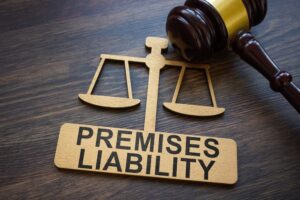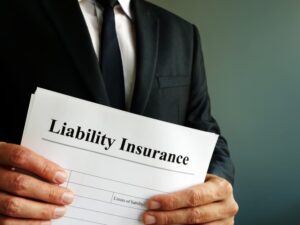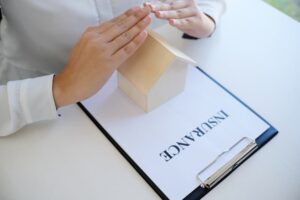
After a slip and fall accident in another person’s home, you may wonder about receiving compensation from their homeowner’s insurance. This is an important question that you can find the answer to in the following post. You also will learn more about premises liability law, the ins and outs of homeowner’s insurance claims, how to make a settlement demand, and how to file a successful slip and fall accident claim by the experienced premises liability lawyer.
Premises Liability Overview

The owner of a home where you had a slip and fall accident is usually liable for reasonably keeping visitors and guests safe. This is called premises liability. To obtain compensation in a slip and fall premises liability case, you will need to prove the following:
- You were on the property legally at the time you suffered an injury. The homeowner may be liable for a trespasser’s injuries in rare circumstances. An example is if a child trespasses and falls into the swimming pool in the backyard and suffers an injury or drowns.
- The homeowner knew or should have known about the hazardous condition that injured you, such as a loose floorboard, loose piece of carpeting, missing handrail, or rotting set of stairs.
- The homeowner did not repair the hazardous condition, even though a reasonable person would have done so.
- You suffered an injury on the property because of the hazardous condition.
- Except for the owner’s negligence, your injuries would not have happened.
Does The Homeowner Have Insurance?
The first question to ask is if the homeowner has homeowner’s insurance. Assuming the person has a mortgage, their lender probably requires them to have insurance. However, if the house is paid off, the homeowner might risk not having insurance to avoid the expense.
Unfortunately, there isn’t any way to verify if a homeowner has insurance. The only way to know is to ask them. Or, you can make a slip and fall claim or file a lawsuit to determine if the homeowner turns the case over to their insurance company. But if the homeowner doesn’t have insurance, you must file your claim with the owner.
Filing A Slip And Fall Claim On Homeowner’s Insurance
Your best chance to obtain compensation in a slip and fall claim in someone’s home is to file a claim on their homeowner’s insurance. The key issue is whether the insurance company will cover the claim. There are several factors to consider that can affect the validity or value of an insurance claim.
Type Of Insurance
The common homeowner’s policy has two types of coverage relevant to a slip and fall accident. They are medical payments insurance and liability insurance:
Medical Payments Insurance
This insurance is in place to cover the medical bills of a person who is hurt on the property. Most homeowner’s policies have medical pay coverage, but the amount available isn’t usually much. It’s common for these policies only to cover $2,000 or $5,000 of medical bills. It doesn’t take a very serious injury to exceed those limits quickly.
However, most medical pay coverage is no fault, meaning you don’t need to prove negligence to receive benefits. You are probably eligible for medical coverage if you prove you suffered an injury in a slip and fall incident.
Collecting this type of coverage isn’t necessarily difficult. You can send any medical bills to the insurance adjuster handling your claim. The insurance company should reimburse you for your medical bills up to policy limits. However, seeking compensation for other losses is much more challenging.
Liability Insurance

If the medical bills for your injury exceed the med pay policy limits, or if you need to obtain compensation for pain and suffering and lost income, you must file on the homeowner’s liability policy. However, the homeowner is only liable for your slip and fall accident if you prove the homeowner was negligent.
Just because you fell and hurt yourself on the property doesn’t mean the homeowner was negligent. You will need to prove that your fall was because of a hazardous condition at the home. So, if you slipped and fell because of snow and ice on the path to the door, the homeowner may have been negligent.
Understanding if you have a valid liability claim also depends on the following:
Homeowner’s Policy Terms
You or your attorney should read the homeowner’s policy carefully. The homeowner probably won’t object; the other option is for you to demand compensation out of their personal funds. You need to understand the circumstances in which the homeowner’s policy will compensate you for an accident in the home.
The Owner’s State Of Mind
The defendant’s state of mind matters in determining if the homeowner’s policy will cover the accident:
- Did the homeowner’s negligence cause the accident? For example, if they left the wooden stairs wet after cleaning them and you slipped and fell, the owner may have been negligent. But you were probably negligent if you fell down the steps because you had six beers.
- Was the owner grossly negligent? If the homeowner was grossly negligent, you can be entitled to both compensatory and punitive damages. For example, if the homeowner tore out the basement steps, didn’t alert you, and you fell 10 feet onto the cement floor below, this may constitute gross negligence.
- Was there malice involved? You also may be eligible for punitive damages if the homeowner intentionally injures you in the home. For example, if he put marbles on the wooden steps so an intruder will fall, this may constitute malice.
Homeowner Policy Limitations And Exclusions
Homeowner’s policies often have limitations and exclusions stated in the policy paperwork. Some that can affect the slip and fall claim’s validity are:
- The location of the accident: The homeowner’s policy may not cover an accident at the bottom of the driveway or in the backyard.
- Deductible: The policy may have a deductible of up to a few thousand dollars. If so, you will probably be on the hook for paying for your initial damages.
- Policy limits: The policy may not fully cover your losses if you have a large claim, such as for a spinal injury.
- Your relation to the homeowner: The policy may not apply if you are a household member.
Renter’s Insurance
If the person in the home rents and doesn’t own the property, they might have a renter’s insurance policy. The policy terms might apply if you are injured in a slip and fall accident.
How Do You File A Slip And Fall Claim On Homeowner’s Insurance?
Assuming the homeowner has insurance, below are the steps to file your slip and fall claim. However, the homeowner might be less than forthcoming about giving you their insurance information. The insurance company can increase their premiums or cancel the policy if a claim is successful. So, some homeowners will not report the claim and will attempt to cover it out of pocket. Beware of this type of agreement, as it usually fails to provide all the compensation you need. Instead, inform the owner you want to consult a slip and fall lawyer before you agree to anything.
If there is a homeowner’s policy in place, these are the steps to file the claim:
Document The Claim And Accident
If a slip and fall injures you on the property, you must get medical attention first. But once you have started treatment, you should take steps to document the accident:
- Speak to any witnesses and see if they noticed the same hazardous condition.
- If you can get photos or videos of the hazardous condition, do so.
- Make notes after the accident to remember what you saw, how the accident happened, and other particulars.
- Note what anyone said who was there after you fell.
- Keep notes or a video diary about your accident injuries, including the limitations and pain you have.
Report The Claim Immediately
You must report the claim to the homeowner’s insurance company immediately. Better yet – have your slip and fall lawyer initiate the process. They know how to keep your claim concise by naming the homeowner, address, and when you suffered an injury. Also, they will provide a quick description of your injuries. Don’t provide any information yourself unless it is absolutely necessary, as everything should go through your lawyer.
You may not have completed your medical treatments yet. If you have completed your treatments, tell them you will provide a settlement demand as soon as possible. If you are still undergoing treatment, tell them you will follow up after your doctor says you have reached maximum medical improvement (MMI). Tell the insurance company that you will not provide them with any statement. If you hire an attorney, they can handle your interactions with the insurance company.
Dealing With Homeowner’s Insurance Adjusters

After you report the claim to the homeowner’s insurance company, they will assign an adjuster to your case. He or she will contact you and the owner of the home to obtain the facts surrounding the accident.
The adjuster’s goal is to take charge of the case and dictate what you will receive in damages, if anything. You don’t want this to happen. Your attorney will control the claim and file a premises liability lawsuit if needed.
The insurance adjuster will probably want you to give a statement for the record about the accident. You should not give a statement if you have not hired an attorney. The adjuster will probably continue to ask for a statement; they might even claim that the case cannot move forward unless you give a recorded statement. Don’t fall for it. You are not required to give them an official statement that they record.
Nothing good comes of a personal injury claimant giving a recorded statement to the defendant’s insurance company. If you have one, the only person who should give a recorded statement to the insurance company is your lawyer.
Your goal is to receive compensation in a settlement without filing a lawsuit. If the case does not settle, the insurance company can get a statement from you via deposition. But at this point, you will have an attorney guiding you.
Next, the insurance adjuster will want your medical bills and records as your treatment progresses. They also will want documentation of your lost earnings. Expect them to ask you to sign releases to obtain your medical records. Be careful here. Tell the adjuster you will give them all medical records, bills, and related information with your demand letter.
The adjuster will probably want you to give them your records before you ask for a settlement. This insurance company is trying to control assets, resulting in less money for you. Reiterate that you will only give them the records when you submit a settlement demand letter.
Submitting A Settlement Demand Letter
After you reach MMI, you must write a settlement demand letter for your accident injury case. This letter will detail the accident, your injuries, and financial damages. This letter includes your relevant medical records, bills, lost earnings information, and other proof of injuries and damages. You also should provide an estimate of your pain and suffering.
Hopefully, this letter will start the settlement negotiation process. The initial demand should be higher than what you might accept. On the other hand, expect the insurance company to offer much less than what you asked for. You may have a few back-and-forth exchanges to arrive at a fair settlement figure.
If you cannot get the insurance company to agree on a fair settlement, filing a lawsuit through your attorney may be the only option. Most personal injury claims end in a settlement, but the homeowner’s insurance company may not want to compensate you fairly. If this happens, you should contact an experienced premises liability attorney.
Speak To A Premises Liability Attorney Today

Mickey Fine, Bakersfield Premises Liability Lawyer
If you suffered an injury in a slip and fall accident, you might have medical bills, lost earnings, pain and suffering, and mental anguish. The property owner can be liable for your injuries, and a premises liability attorney can seek the compensation you need. Please contact a Bakersfield personal injury attorney today for more information and a case evaluation. Remember, the premises liability attorney doesn’t usually charge upfront legal fees. They are only paid if your case ends in a settlement or favorable verdict.
